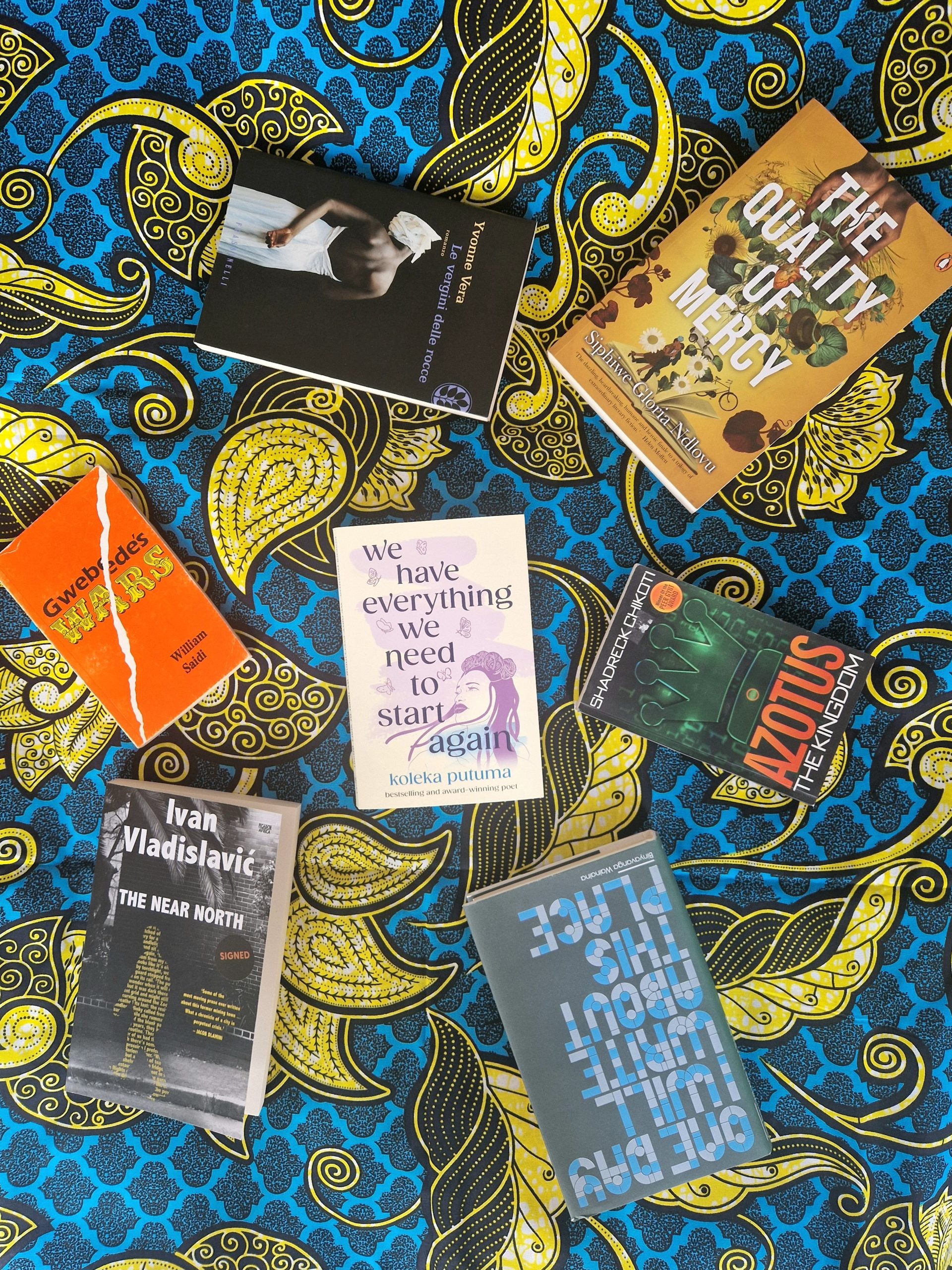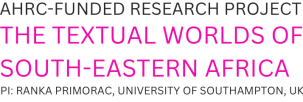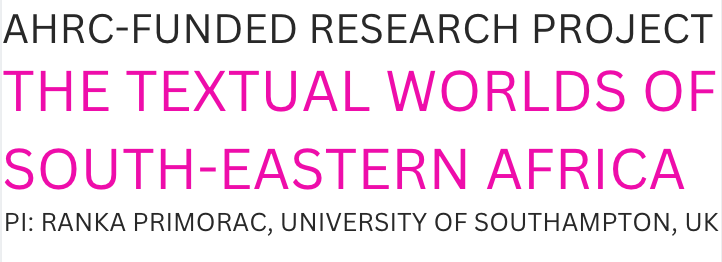
Welcome to the webpages of ‘The Textual Worlds of South-Eastern Africa’ – an academic network seed-funded by UK’s Arts and Humanities Research Council, comprising colleagues from the universities of Leeds, Rhodes, Southampton and the Witwatersrand. The grant was awarded in early 2020, just as the global Covid lockdowns were getting under way. The planned academic events were finally able to take place in 2022, 2023 and (unexpectedly, following a brief grant extension) 2024.
This website, still under construction, is an official record of the network’s events and outputs, as well as its evolving research agenda. Here, for the record, is an overview of the network’s original context and intellectual aim, formulated by Ranka Primorac in the now distant-seeming days before the pandemic.
Welcome to the webpages of ‘The Textual Worlds of South-Eastern Africa’ – an academic network seed-funded by UK’s Arts and Humanities Research Council, comprising colleagues from the universities of Leeds, Rhodes, Southampton and the Witwatersrand. The grant was awarded in early 2020, just as the global Covid lockdowns were getting under way. The planned academic events were finally able to take place in 2022, 2023 and (unexpectedly, following a brief grant extension) 2024.
This website, still under construction, is an official record of the network’s events and outputs, as well as its evolving research agenda. Here, for the record, is an overview of the network’s original context and intellectual aim, formulated by Ranka Primorac in the now distant-seeming days before the pandemic.
In the last ten years, African literature in English has taken the international literary scene by storm. The UK-based Caine Prize consolidated its standing as a key broker of African literary merit, helping to pave the way for increasingly influential organisations based on the African continent (the Kwani Trust and Jalada in Kenya, Writivism in Uganda, and many others). The Nigerian publisher Cassava Republic Press pioneered an innovative business model that has helped to make an extended range of titles and genres available to trans-Atlantic audiences. A burgeoning festival scene (led by Aké festival in Nigeria, Abantu in South Africa and London’s Africa Writes) combined with a new generation of literary blogs (Brittle Paper, Africa in Words, James Murua’s African Literature Blog and others) in promoting a new generation of writers and a fresh repertoire of forms and genres.
Nigerian authors (Chibundu Onuzo, Leye Adenle, Ayobami Adebayo and more) are, yet again, in the forefront of critical visibility, confirming West African pre-eminence in continental canons. But authors from other parts of Africa have also come to the fore – some from nation-states in the South-Eastern region, previously unnoticed on the global scale. Critically praised fiction by Uganda’s Nansubuga Makumbi and Zambia’s Namwali Serpell, for example, brings into view new cultural contexts and new sets of local antecedents. Elsewhere, texts by emergent authors (such as Zukiswa Wanner in Kenya and Sifiso Mzobe in South Africa) defy easy genre classification. The field of African Literature in English is now bigger, more nationally and formally diverse, and better known to non-specialist audiences than ever before. New scholarly approaches may well be needed to make cultural and historical sense of it. The parallel emergence of two seemingly unrelated scholarly ‘turns’ points at possible ways of articulating fresh research questions and new methodologies of thinking and research.
The recent academic turn towards decolonial versions of World Literature has broadly paralleled the global rise of African literature. It has taken place alongside an increase in the scholarly interest in popular culture in Africa (of which the African Popular Literature is commonly regarded as a sub-set) – an established umbrella term for local non-elite cultural texts and forms, often placed in opposition to elite or ‘postcolonial’ ones. These broad terms are multiple signifiers: they have the capacity to describe and classify types of textual production, but they can also signal researchers’ methodological preferences and academic locations. Usually institutionally separate and often hierarchically opposed, World Literature and African Popular Literature nevertheless have the potential to speak to each other’s procedures and assumptions, especially when strategically deployed for the purposes of this Network, with reference to often neglected South-Eastern African contexts.
Recent studies by world literature theorists Pascale Casanova (transl. 2005), the Warwick Literary Collective [WReC] (2015) and Pheng Cheah (2015) enable conceptual ground-clearing. Casanova and WReC foreground the notion of literary system (arguably useful on local and regional scales, as well as the global), while Cheah elaborates on the potential of textual forms to generate emancipatory futurities; his definition of ‘world literature’ need not be limited to elite cultural flows. On the other hand, recent work by scholars of popular literature and culture (Newell and Okome 2014; Barber 2018) makes visible both the gaps and inconsistencies in traditional understandings of ‘the African popular’, as well as the omissions (especially with regard to the treatment of genre) in world-literary theorising. The Network will problematise the jagged and fuzzy disciplinary boundary between Postcolonial/World Literature and African Popular Literature with the help of genre theory (Frow 2014), African media history (Ogola 2017, Nyabola 2018) new formalisms (Moretti 2013, Levine 2017), postcolonial book history (Brouillette 2007, 2019), practice-based research (Krishnan 2018), and ongoing research by the core Network members.
We aim to enter the unevenly theorised scholarly terrain summoned by the Postcolonial World Literature/African Popular Literature boundary, and begin to make an extended intervention. This is, to the best of our knowledge, the first project that seeks to problematise World Literature while foregrounding the contributions of local authors and African scholars.

